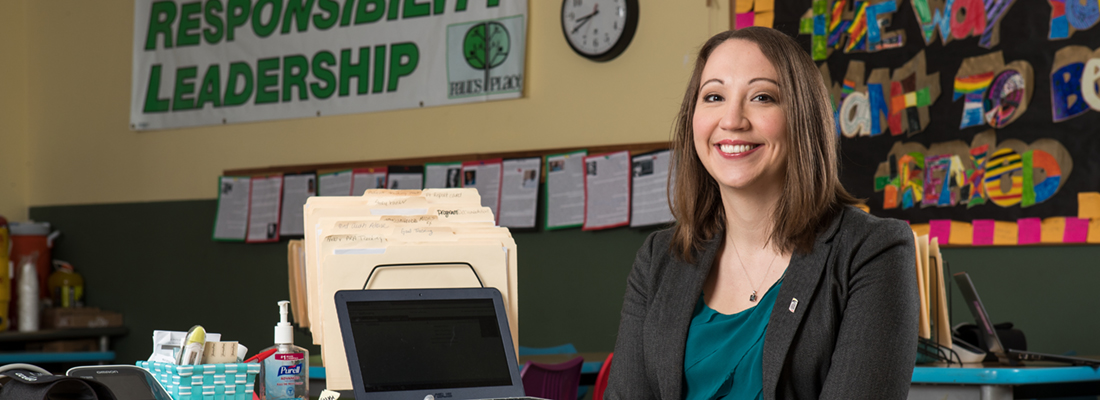Kelly Doran, PhD, MS, RN | University of Maryland School of Nursing
View Full 2017-2018 Champions of Excellence Gallery Find Out More About the Champions of Excellence Campaign
As a little girl playing make-believe, Kelly Doran, PhD, MS, RN, always dreamed of being a nurse. With endless ambition, she earned her Registered Nurse degree, but the dream began to change when she realized she didn’t want to treat people after they were sick. Instead, she wanted to focus on prevention.
So she pursued her master’s and doctorate in community/public health with a focus on research at the University of Maryland, Baltimore (UMB), graduating in December 2011 and joining the faculty a month later as an assistant professor at the University of Maryland School of Nursing.
Her childhood dream has transformed her into both an influential researcher and community changer. When she heard about the nonprofit community care organization Paul’s Place — which has a rich 34-year connection with the University — she jumped at the chance to get more involved as part of her faculty practice.
Paul’s Place is a keystone in improving the quality of life for the people of Southwest Baltimore. Located about a mile away from the University, it provides access to high-quality health care, education, employment, and housing options, as well as other support needs for homeless and low-income individuals in the area.
Today, Doran is director of health and wellness for Paul’s Place, where she spends two days a week on-site integrating health and wellness concepts into its programming. She serves as a faculty preceptor for the UMB students who come to do service learning or clinical placements, and also runs the public health clinic that provides both basic care and programs for mental health, substance abuse, wound care, and stress.
Doran describes it as a “public health primary prevention clinic,” rather than a typical clinic or hospital. It provides a range of services from basic first aid to intensive clinical case management.
“[Paul’s Place] is absolutely amazing. One of the things that makes it unique is that it’s a one-stop shop,” she says. “Our population is often distrustful of the health care system and of social services in general, so it’s really important that we have a good and trusting relationship with them. We try to provide as many services in-house as possible so we can meet their needs on-site and continue to build relationships with them.”
Not only is working at Paul’s Place an example of how much of a champion for public health Doran really is, but it’s also the perfect place for her research.
Recently, Doran has been partnering with behavioral psychologists from the University of Maryland, College Park and researchers from universities in Michigan and Florida to study delayed discounting and executive functioning in the guests at Paul’s Place.
Delayed discounting refers to the decline in the value of a reward because of the delay to its receipt, while executive functioning refers to the parts of the brain that let us plan, organize, and complete tasks. Essentially, the research team is studying how trauma changes the way the parts of the brain work, thereby affecting perception and impulses.
When dealing with delayed discounting in combination with impulsivity, it is harder for a person to wait for a distant reward because they desire more immediate gratification.
For example, they may turn to smoking for stress relief without focusing on the possibility of contracting lung cancer 10 years from now.
Doran and the rest of the team look at how change in executive functioning after trauma impacts a person’s health behaviors, outcomes, and engagement with health services.
“We have a trial where we have an intervention group play computer games to hopefully improve their memory and impulsivity so they’re at a place to think about and prioritize future events and delay gratification, essentially working on improving their health,” she says.
Being able to see and work with the guests at Paul’s Place two days a week is not only personally rewarding, but also gives Doran a better sense of what her guests need and how to help them. Personal interaction in combination with data is the best way to create well-rounded, successful solutions in both a statistical sense and in a real community-based setting.
So what does the future look like for Doran? She plans to continue applying for new grants to study both impulse and substance abuse. She hopes to also create more in-depth programming at Paul’s Place to educate guests about substance use and misuse and mental health as well as provide the guests with more treatment options.
When not working and researching at Paul’s Place, Doran spends her work time teaching and mentoring students at the School of Nursing.
“I’m really passionate about getting students to understand and appreciate research. It’s all about helping them gain and understand concepts and apply them in the real world,” she says.
The overlap of Doran’s research, teaching, and daily work at Paul’s Place is her favorite part of the job. Yet, she knows the reward from seeing the facets of her work connect is only magnified by the support she receives from the leadership at the School of Nursing and UMB.
“We have this mission [to improve the human condition], and to complete it there is this juggling of research and teaching and practice, but everyone is very supportive of your strengths and what you can contribute. They do what they can to foster [those strengths],” she says.
As her personal and career life continue to evolve, like with the birth of her first child in 2017, Doran knows UMB is the place she wants to stay.
“I absolutely love my job,” she says. “I feel every day that I’m at Paul’s Place and with students that I’m making a difference. I love my research. I really feel like it’s going to help the community.”



